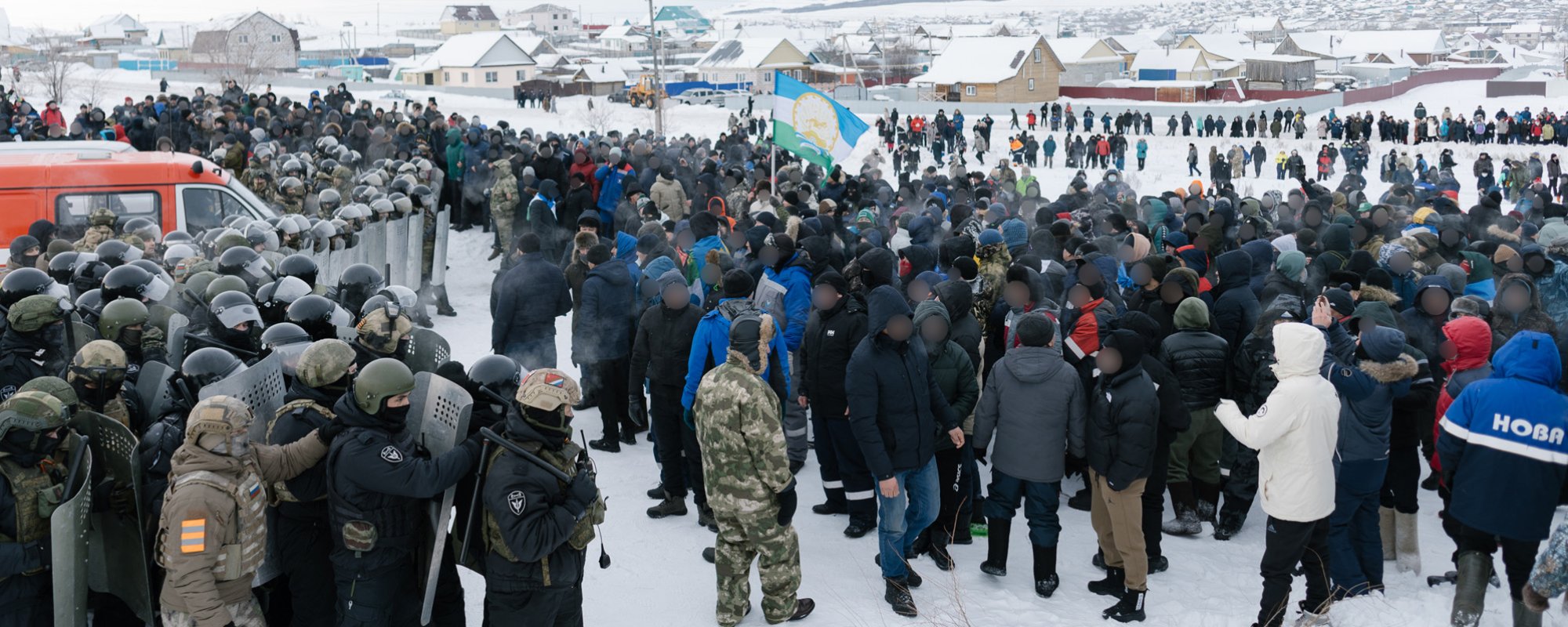On 17 January, a court in Russia’s remote Bashkortostan region sentenced indigenous rights activist Fail Alsynov to four years in prison. Thousands came to the final court hearing to protest — a rare sight in wartime Russia. Here is an account of the events of that day as seen by an OVD-Info reporter on the ground.
*some names are changed to ensure safety and privacy of the individuals
Bashkortostan, known legally as the «Republic of Bashkortostan», is a region in Russia. Located at the foot of the Urals, it’s populated mostly by Bashkir, a Turkic ethnic group native to the region, whose land was conquered by the Russian empire in 16th and 17th centuries. The Bashkir are known for their long-lasting struggle with imperialism. One of their most famous heroes — Salavat Yulaev — was instrumental in the Peasant’s War of 1773. His statue still stands over the central square in Ufa, the capital of Bashkortostan. His legacy still inspires Bashkortostanis today: in 2020, activists from Bashkortostan successfully protested the Russian state’s mining operations in the sacred mountain of Kushtau. Now, Fail Alsyonov, one of the protests' key leaders, has been arrested by the Russian authorities.
Alsynov was charged with «incitement of hatred», a criminal offence under Article 282 of the Criminal Code of the Russian Federation. Alsynov gave a speech at the protest, attended by Ishmurzino villagers, where he allegedly used the expression «kara khalyk» (Bashkir for «common folk, mob», translated literally as «black people»). The term «black» is considered an ethnic slur in Russia, and is largely used against people from the Caucasus region. The criminal case was initiated after a statement was issued by the head of Bashkortostan, Radiy Khabirov. Alsynov claims that his words were deliberately mistranslated from Bashkir.
Baimak is a small town in southern Bashkortostan, surrounded by the Ural Mountains. Most of its inhabitants are native Bashkirs. The way of life is simple: people breed horses and cows and often work as beekeepers. There are no high-risers in Baimak. A winding road leads to the courthouse. Despite the harsh frost, men and women of all ages gather at the courthouse. Police block the roads there, and a tractor was used to cut through the crowd. The people are forced to park their cars and continue on foot.
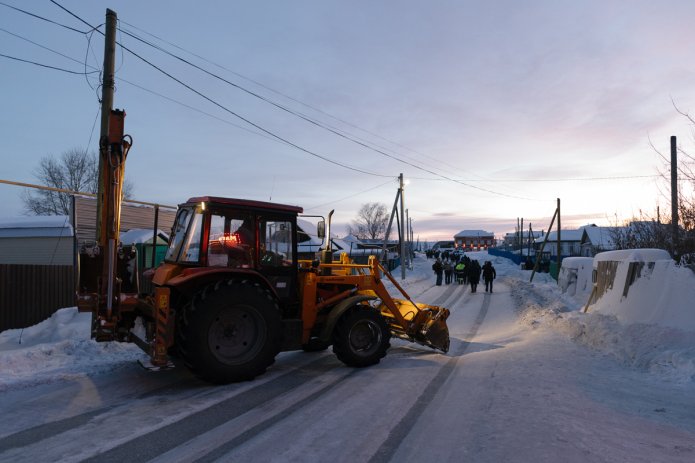
There have been internet outages all over the republic since early morning. In Baymak there is neither internet nor cell service. An hour before the hearing, a busload of Rosgvardiya men pulled up outside the court [Rosgvardiya, short for Russian Guard, is an internal military force that reports directly to Putin]. Police in riot helmets sit inside the courthouse, and two more are on duty nearby. The hearing is scheduled for 9:30.
It’s impossible to call a cab; cell service is being jammed by the authorities. We hitchhike the roads and soon get a ride with Murat. He’s a local, from Baymak.
«The road is closed there. They say that the riot police have already blocked everything. I’m taking a detour», says Murat. «We know Fail and support him. He stands for the Bashkir language and helps people. I think the head of the republic wants revenge for the Kushtau protests. Fail travelled to all the villages and forbade the sale of moonshine and vodka. There aren’t many young people left here, but all they want is to drink. They wanted to ban the Bashkir language in schools, but Fail rallied us and the language stayed. My children’s school was going to be in Russian, but now it’s in Bashkir».
Language has long been problematic in Bashkortostan. According to Aigul' Atanova, deputy chairwoman of the Republican Commission of Parents at the World Kurultai Bashkir, children have problems with the language in school and kindergarten. In order to have Bashkir taught in kindergartens, parents have to organise the classes themselves and provide the resources. It’s hard to find them anywhere but Ufa, Bashkortostan’s capital.
Perhaps that’s why people paid special attention to Alsynov’s speech, and why he’s being persecuted: he addresses the crowds in Bashkir.
Murat recounts that on the 15th of January — the day of the first protest — the courthouse was completely surrounded by cars. The same is true today. Hundreds of people have arrived an hour before the hearing. They chant in Bashkir and Russian: «Azatlyk!» «Freedom!»
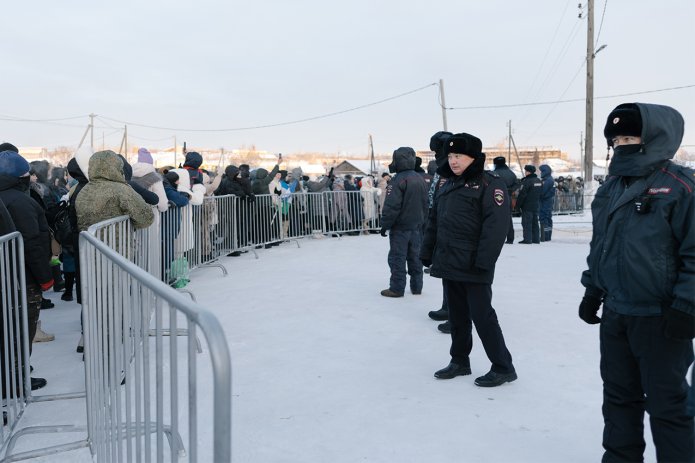
«We came all the way from Ufa; we drove all night», says a man calling himself Azat. «Fail Alsynov is fighting for a clean and orderly republic. He’s not an extremist, but his words were mistranslated into Russian, so that it seemed he was insulting a particular nation. We’re here to support our fellow countrymen. There are rumours the so-called „Ukronazis“ are behind this, but it’s not true. Everyone here knows at least someone on the front lines».
Azat stated that his brother — in order to make money — volunteered for the war in Ukraine. There, his battalion recorded a video supporting Fail. Azat doesn’t support his brother’s decision to go to war: «I discouraged him, and have no intention of going there myself. They sat in a swamp for a week. Why sit there and freeze? My brother told me there’s nothing to be gained there».
Many people who we spoke with also mentioned that their relatives went to the front out of desperation: there’s a job shortage in Bashkortostan.
«I have three sons; they can’t go anywhere; they have to live here», says Gulnaz, 52. She has lived in a Bashkir village all her life. «Many go to war and die there. At first, they left because they were drafted, now they’re leaving to get a job — they pay them there. Some go to „defend their homeland“. From who?»
«I’m from Tselinniy, a village in Bashkortostan», says Zagir, a man in his forties, dressed for the cold. «Some guys who returned from the „SVO“ are here too [SVO — Special Military Operation, what the Russian Government calls the war in Ukraine]. Of course, Fail was against the SVO. Many people from my village served in the war; many died, and still aren’t being returned from the battlefield. They went because of bad circumstances — some needed work, others needed out of prison. What do you think, is this right? I don’t think so. They’re exterminating our people. I don’t even know why they’re fighting there».
![[Text on the patch: «We don’t leave our own behind!»]](/sites/default/files/styles/material_width_695/public/photo_baimak-110_3.jpg?itok=xQWAqao5)
Ruslan Gabasov is an ally of Fail and a leader of the indigenous rights organisation «Bashkort», which is banned in Russia. He routinely stated that the Ukraine war is «not our war»: «The Ukrainians have never wronged us, while the empire has always oppressed us. Why should we fight for them now?» he said in an interview. Telegram channels associated with Bashkir nationalists have a similar view.
Alsynov himself has published an anti-war statement. It says «now is not the time to stand with weapons in your hands». He wrote that Russian propaganda falsely claims that the Russian language isn’t being taught in Ukraine. Meanwhile, people from Bashkortostan «go to war, forgetting that the Bashkir language is banned in their republic».
«We cannot leave, our home is here»
Local authorities prepared for a high-profile trial: the day before, activists who were organising protests for the preservation of the Kushtau mountain in 2020 were detained in different parts of the republic. Media reported that Federal Security Service officers came for Ilnar Galin and Yulay Aralbaev, and police detained Rafail Abdrakhmanov. The security forces tried to get to Ildar Yumagulov in Baymak — the electricity was cut off in his apartment. After a support group came to his house, security forces left and the power returned. On 16 January, Fail Alsynov was added to the list of extremists and terrorists.
Surrounded by a crowd outside the courthouse, there is a man in a wheelchair. A woman carefully wraps his legs with a chequered blanket. People come up to them to greet the man and hug him. His name is Ilsur Irnazarov, a well-known environmental activist in the republic. Last summer, the Baymak District Court fined him 10,000 rubles (US$ 110) because of a people’s gathering in the village of Temyasovo to discuss the construction of quarries. Today his comrade is being tried in Baymak.
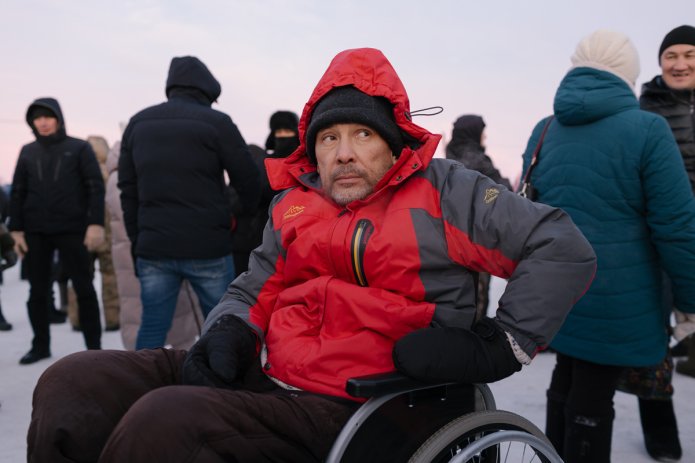
«I know Fail personally», he says. «He came to meet me as a student 20 years ago. Since then, we have been hand in hand with him all the time», Ilsur often pauses to hug someone or nod «salaam alaikum» [Bashkir for hello, literally «peace be upon you» in Arabic]. «Not a single event in the republic could go without him and did not cause any complaints from law enforcement officers, because everything went smoothly. Even now there are people from different social classes, different ages, and everyone behaves properly. This is what civil society means».
«It all started on 28 April», continues Ilsur. «Local residents gathered in the village of Ishmurzino [Baymak district of the republic], they were outraged that gold miners were going to dig a new quarry near them and extract gold from the mine on the Irandyk mountain range. Fail spoke at this gathering and said that „the Armenians will go to their country, the Russians will go to Ryazan, the Tatars will go to Tatarstan, the kara khalyk will go to their place. But we can’t leave, our home is here“. It was because of the phrase „kara khalyk“ a [criminal] case was opened against him».
That time the residents of Ishmurzino achieved their goal: at the end of May, the Eurasian Mining Company abandoned the development of deposits, citing the «results of the work of the republican interdepartmental commission on the prevention of offences in the field of subsoil use» as the reason.
The «Bashkir Trans-Urals» — the region of Bashkortostan that includes the Baymak district — is full of natural resources that are mined by large Russian corporations. Residents of the republic are worried by serious environmental problems due to mining, so people regularly organise public gatherings.
The educational project «Tatar Encyclopedia» reports that the literal translation of «kara khalyk» is «rabble, black people». This was the name given to the feudal-dependent population of the Golden Horde in the 13th–16th centuries, which consisted mainly of rural community members, artisans and small traders. The court-appointed specialist Ainur Khuzhakhmetov, who prepared the «academic translation» of Alsynov’s speech, translated the phrase as «black people» and indicated that «the meaning of the phrase corresponds to the meaning of the words „khachi“, „churki“, „black-faced“ [Russian slurs levelled against non-Slavs, primarily those of Caucasian and Central Asian descent]. Khuzhakhmetov’s translation is attached to the criminal case.
Alsynov was reported by Bashkortostan’s governor Radiy Khabirov himself. He called Fail «the leader of the protest movement» and demanded that he be prosecuted for «extremist activity» and «discrediting» the Russian army. The case was initiated and the activist and his parents were searched. Alsynov later insisted when addressing to Khabirov that the experts had mistranslated his words from Bashkir and that by saying «kara khalyk» he was referring to «labourers», while he himself has nothing against «representatives of other peoples» if they «respect our customs and traditions».
On 15 January, five thousand people came to support Alsynov, people chanted: «Bez — kara khalyk»! [«We are the common people!»]
«The Russian flag is here, but where is the Bashkir flag?»
People outside the courthouse pour tea for each other, hand out homemade pies, some stand on their own jackets to keep their feet warm, women wrap themselves in scarves and shawls. It’s -26 °C (-14.8 °F) outside.
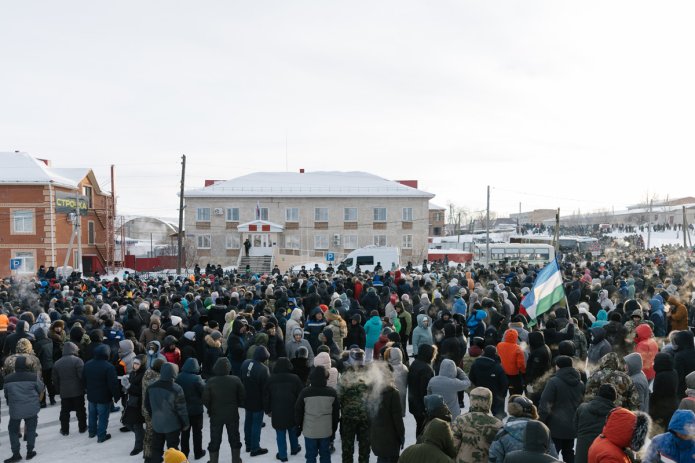
«There are people here from remote districts, from all over Bashkiria. And all voluntarily, no one is forcing anyone. He didn’t steal anything, he didn’t beat anyone up», says Guzel Maratovna from the village of Temyasovo, an elderly woman in a black duffle coat. «He defended Kushtau for the whole of Bashkiria, for our children and grandchildren».
According to «Verstka», an independent Russian media, Fail was a member and deputy chairman of the national organisation Kuk Bure [«heavenly wolf» in Bashkir, its symbol is a wolf’s head against the sun]. Ruslan Gabbasov, an associate of Alsynov, in his book «Notes of a Bashkir Nationalist» describes the ideology of Kuk Bure as «Bashkir liberal nationalism». He says that the organisation attracted Bashkirs «who were not afraid to go on 'rumbles, brawls’» with Russian nationalists and Caucasussians, and was also popular among the city’s youth. Kuk Bure advocated the preservation of the Bashkir language and in defence of the Toratau mountain, another sacred mountain that caused protests in the past. According to Gabbasov, Alsynov «gained fame among the Bashkir public» through such activities.
In 2014, after a split due to internal disagreements («they often argued with each other and quarrelled over nothing», Gabbasov writes) and mutual suspicions of «working for the chekists» [a slang term for secret police], Alsynov and Ruslan Gabbasov left Kuk Bure and created the more radical Bashkir national organisation Bashkort. Its activists advocated for the sovereignty of the republic and the nationalisation of resource extraction enterprises, they insisted on the use of the Bashkir language and demanded that key positions in the republic’s government be held by Bashkirs. Bashkort, unlike Kuk Bure, addressed its activities to the inhabitants of villages and rural areas.
Bashkir nationalists have focused on criticising local rather than federal authorities. In 2020, after protests on the Kushtau shikhan, the Supreme Court of Bashkortostan declared the Bashkort organisation extremist.
«They wanted to take away our famous soda industry, but Khabirov failed — we defended it! They want to crush us Bashkirs one by one,» says Zarifa, a middle-aged woman, emotionally. «Yesterday they cut off our WhatsApp, and now they are cutting off our mobile phones. We do not want to give our wealth, our lands to some outlanders. Half of our men go to work in the north, and some foreigners, Armenians and other nations, want to open a gold mine here. We don’t know exactly that they are Armenians, but that’s what the media says. We just want our men to work at home, to be with their children, to leave our wealth to our descendants. We should live here».
The Russian flag flies above the court, but people in the crowd have Bashkort flags. Some are waving them, others are just standing there, wrapped in its cloth. «You see, the Russian flag is here, but where is the Bashkir flag?» someone says, pointing to the courthouse.
Bez berge! Bez berge! Bez berge!
Police are warning people of responsibility for participating in an unauthorised rally, the crowd is chanting — it seems there are about the same number as on 15 January, that is about five thousand of them. People see Alsynov entering the courthouse and start to whistle and shout words of support.
At the court perimeter there are about a dozen security officers. They silently observe and do not interfere. At the side buses are parked filled with riot police, their black helmets gleaming. More and more people gather before the court, some bring families along.
![[Text on the bus reads «Shame»]](/sites/default/files/styles/material_width_695/public/photo_baimak-26_1.jpg?itok=MSnpmikc)
Tall man in a traditional bashkir headdress stands among the crowd. He looks intimidating. His long beard is frozen, lined with drops of water.
«I am from the town of Salavat. I came here for justice, so that our people are not oppressed; we also have the right to speak up. How can Fail be a terrorist? He defended Kushtau, raised the people, well done. We are already being oppressed in everything; officials have taken everything they can from the Bashkirs, all our resources. We stand up for what we had, we want to get it back. In general, it would be better to separate from Russia and remain simply Bashkortostan — a separate people’s country. I’ve always dreamed of this. Our guys went to war without any reason, why do we need this war? Why should we sacrifice our men?» With these words, he takes out a small pink electronic cigarette from his pocket.
Some in the crowd are sure if what is happening «reached Putin», he would have sorted out the situation. «Does your media reach Putin?» asks Aytugan. «He will solve this issue, there are so many people gathered here! Not everything is reported to him completely. And Khabirov is regarded very poorly here. If we liked him there wouldn’t be so many people here today. What has he done over the years? He’s digging his own grave».
«Bez berge! Bez berge! Bez berge!» [Bashkir for «We are together!»] people shout and continue with: «There will be more of us!» And this is what’s happening — according to various estimates, there are up to 10 thousand people at the courthouse building.
«Second Kushtau. This is like a second Kushtau», says a passerby woman in a warm fur coat.
A man with a megaphone comes out of the courthouse. He tries to say something, but nothing can be heard. People shout over him, chanting Fail’s name. It soon becomes known that judge Elina Tagirova sentenced Alsynov to four years in a penal colony. It’s not four years in a settlement colony, as requested by the prosecutor; the final sentence is more severe.
Alsynov told reporters that the verdict came as a surprise to him and he didn’t plead guilty: «Thank you all very much. I will never forget this. I have always fought for the rights of my people, my republic. Inshallah, [Arabic for „God willing“] I will see you again».
For a split second, the jammers falter — notifications on social networks break through. Some people manage to read about the verdict in Telegram channels, but they cannot believe it. When the lawyer leaves the courthouse and announces the verdict, a murmur ripples through the crowd, and here and there, the crowd shouts: «Shame!» and «Give Fail back, and we’ll leave!» The crowd shames the law enforcers who are lining up outside the court. Some of them have Zs on their helmets. [letters «V» and «Z» are used as symbols of pro-war Kremlin propaganda]. In front of the line of riot police, people stand up in response. For a while, thousands of people gathered and a cordon, around 300 of them, just stood in silence opposite each other.
Kadim from the village of Zilar says his brother was detained tonight in Ufa. «My brother’s wife called me, and he told her [to tell me] to stay out of trouble», he tells us. His brother is a friend of Fail’s. Police used cameras to find him, stopped him on the motorway, and took him away. Kadim says that a year and a half ago at 6 am, law enforcers came to his house, broke the doors and windows, cuffed him as he was in his underwear, and took him to the department, all because of the Kushtau protests. «The republic is messed up, and the governor is saving his hide; he is the lowest man here, ask anyone».
A man with a megaphone reappears on the porch and attempts to persuade people to disperse. They do not react to him. Suddenly, an escalation: the riot police bang their batons on their shields and advance toward the crowd. People shout, police car sirens wail, and snowballs fly at the cops. Some people are grabbed, and the riot police try to clear the way, beating people with batons, but no one budges.
Stun grenades explode, and columns of smoke appear here and there above the crowd, only to dissipate quickly. People fall to the ground, grasping at their eyes and rubbing their faces with snow. Most bystanders do not intervene in the scuffle, but thermos mugs and pieces of ice fly at the security forces from all sides; they hide behind their shields. The arrests continue. One man is flanked, beaten with batons, grabbed by his legs, and carried away. The crowd shouts, «Enough!» and a thin female voice is clearly recognizable: «Slaves of the system, slaves!»
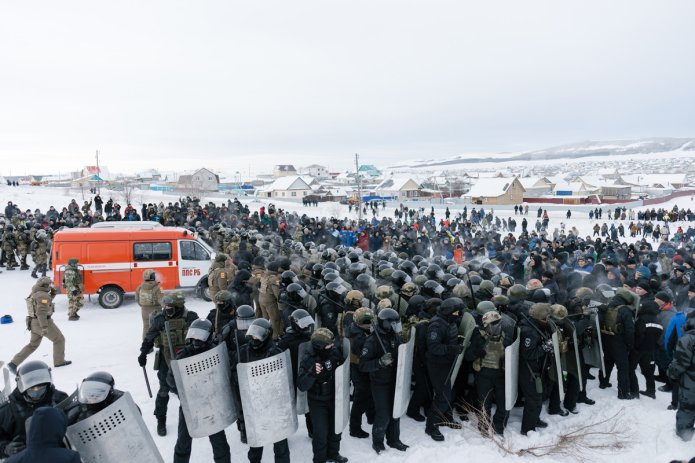
A dozen or two riot policemen suddenly run aside, dropping their shields. They start rubbing snow on their eyes, sneezing, and blowing their noses to the shouts of «Shame on you!» They must have either had their teargas canisters thrown back, or the wind blew in their direction.
There is a pause as the law enforcers stop pushing people away. People calm each other down saying to avoid provoking the cops. Meanwhile, the crowd is growing, cursing the regional governor’s name: «Down with Khabirov!» and «Shame on Khabirov!» Ten minutes go by, and explosions are heard again as the rosgvardians use batons.
Several ambulances are on duty by the road. There are many gas victims — people complain of pain in their eyes, and one man’s head was smashed. A sturdy guy gets out of the car, holding cotton discs to his eyes. There are red circles around them, it burns. People run up to him and guide him as he walks.
«I can’t see. I got gassed», the guy explains. «But we are holding on». Then, he loudly cries out: «Allahu akbar!»
«About 20 people sought help», says a nurse from one of the teams. «It’s because of the tear gas. One was beaten on the head with batons — they were treating his wounds. Some more went to the emergency room on their own».
In a hoarse scream, a woman from the crowd shouts to the law enforcement officer, at first in Bashkir, the words are indistinguishable, then she switches to Russian: «Senseless, how are you not ashamed?»
«Why should I be ashamed?» He slowly turns around and walks in her direction, a dark V sticker on his khaki helmet.
«You betray your own people! Dare to go to war with women! Where is Khabirov, why isn’t he with the people?!» the woman becomes hysterical. «You are spraying gas at your own people! Go to Ukraine and fight! Why are our sons dying there, and you’re out here against the peaceful people?! Shut your mouth, you fascist! Did Khabirov put money in your pocket?! Why isn’t he here?! Why are you standing here and not him?!» At her shrieks, he turns his back and silently walks away.
Another woman is sobbing and shouting at people with shields to the cheers of the crowd. «You can’t give me my husband back! Why are you standing here? You bastards! You are not men! The way my children are suffering, one day yours will suffer too! When they put you in jail, your wives will weep just the same!»
According to her, her husband was drafted in September 2022 and they have not seen each other since. The family is raising three children. The husband had a stroke after which he still stutters, but he was taken anyway. She continues to shout frantically: «Bastards, one day god will punish you! Go to Ukraine so it’ll be fair: war like war. Or give me back my husband, please! I will fight for him to the end. I’ll go to Putin, to Khabirov, I don’t care. Why are you here?!» — she wails and wipes away large tears.
The cops looks at her over their shields in silence.
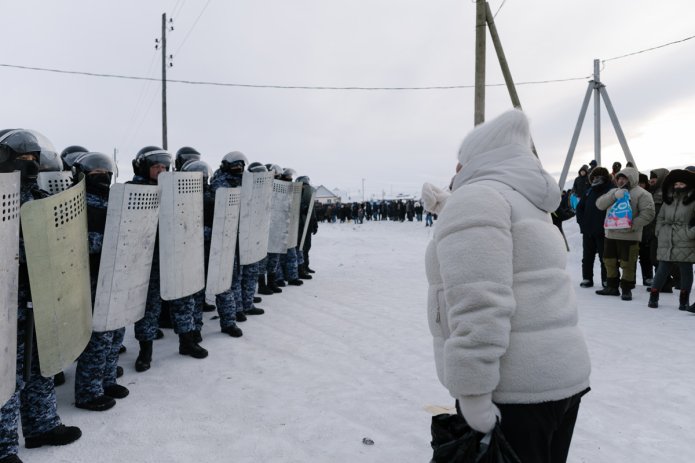
In December, journalists reported that Bashkortostan became the leader in the number of war dead in its macroregion — 1,242 people. They noted that the list included only those whose deaths were recognised by the Kremlin, relatives of the dead, or educational institutions and other public organisations. That is, the real number of the dead may be higher.
«Destructive elements»
By 2 pm, the security forces are still trying to free the area, but they are having no luck. Alsynov should still be in the courthouse. Only home wi-fi is stable in the city, and people, having learnt information from acquaintances, pass on to each other news about the blocking of protest Telegram channels and media outlets covering the protest. In search of the internet, we seek help from locals and are invited to Merhaba’s house.
Merhaba is a hospitable woman in her eighties. She says that she herself has just returned from the courthouse. She puts on the table flower and linden honey, jam in bowls with Uzbek ornaments, homemade dumplings with hot broth — «warm up, girls» — homemade butter and korot, a sour Turkic dish that looks like dried cottage cheese. She pours hot tea with milk into saucers.
«Every day we cry, we feel sorry for him», she says of Fail, wiping away her tears. «It’s not fair. We know the translation and understand perfectly well what „kara khalyk“ means. It’s not fair. My eyes are even swelling up».
Merhaba takes everything to heart. Her children have moved away: her son works in Moscow and her daughter in Ufa. They, she says, also support Fayil, but she told them that she did not go anywhere today, because they were worried. «We realise that he is innocent, he didn’t say anything against the authorities. He called for the people to stop drinking, to come to their senses, to protect their nature. He’s rooting for the people. He speaks from the heart!» — the woman is indignant.
When we return to the court half an hour later, rumours of a revised verdict are spreading through the crowd and protest chats. One man approaches the riot police closely and says: «You should drop your helmets and shields and leave». «You get paid for this, and I don’t», says another.
Another man just spoke to a rosgvardian and explains, walking away: «This is my neighbour. He’s a good guy, I know him. He won’t beat me in my face. It is his job: he works for the police and has to be there».
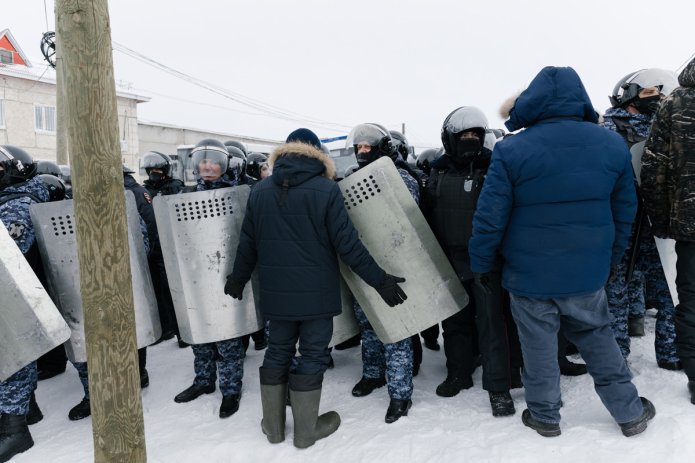
By about three o’clock in the afternoon, the deputy commander of the Ural riot police squad, Nazim Gayazov [his identity was established by the Agency, an independent investigative media], enters into negotiations with the protesters and offers to disperse in exchange for the release of the detainees.
People have been standing outside for several hours. The owners of one of the nearby houses call the gathered to warm up, and they go inside, taking turns. There is a large stove in the house, people put their hands to it to warm up. One man puts a chair by the stove and leans on it with his bare feet. Children are playing in the next room. Women pour tea with milk, distribute cookies.
«The people are already boiling with anger! Why the riot police? We would have decided everything ourselves!» the woman says decisively. «We will not give up our Batyr [Turkic for brave warrior]. Khabirov should take his mafia out of here».
A woman in a dark shawl and a shabby fur coat is sitting near the stove. She is talking to someone on the phone — in Bashkir, I can only understand the name «Fail», the surnames «Khabirov» and «Putin». The woman’s name is Zilya Fanityanovna.
«I couldn’t find a place for myself the day before yesterday, when there was a trial, so today I left the house and hitched a ride here», she says. «I am Fail’s fellow countrywoman, his teacher. Fail was raised in a large family, he has four children himself. I taught the history and culture of Bashkortostan. Probably, I have contributed to his patriotism too. After joining the Russian state in the XVI century, our people suffered many tragic events, I could not talk about it without tears. Bashkirs fought for their liberation and their lands, there were many uprisings against colonisation. No one has fought like us and the Indians in America. But now they hardly talk about it — in 2005 I retired, about the same time they stopped teaching my subject».
Around five o’clock in the evening, Fail Alsynov’s father once again asks the crowd to leave. This time, people give up and gradually disperse. Fail is being taken away in a police van.
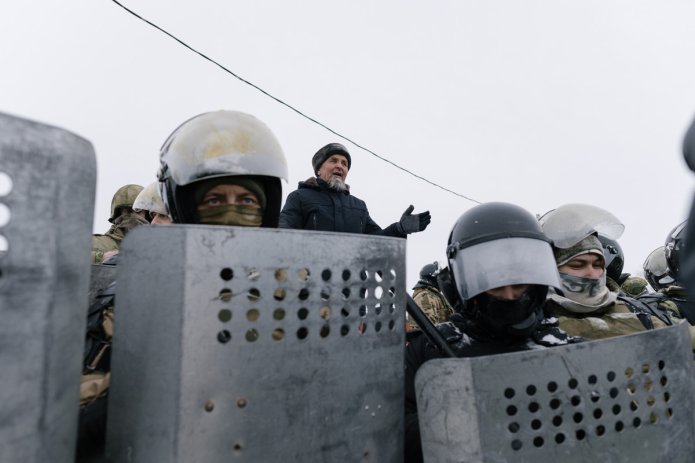
It will soon become known that six people detained during the protest were later arrested. Denis Skvortsov, Fanzil Akhmetshin, Yulai Aralbaev, Radmir Mukhametshin and Dmitry Petrov, were sentenced to 10 days of arrest. Ilnar Galin was sentenced to 13 days. The activists were charged with «violating the established procedure for organising or holding a rally» (Art. 20.2 of the Administrative Code). The Investigative Committee reports on the initiation of a criminal case on mass riots (Art. 212 of the Criminal Code) and the use of violence against a representative of the authorities (Art. 318 of the Criminal Code).
In the evening, a news story called «Verdict to an extremist» is shown on the local BST channel. They say that «Russia’s enemies must be punished». They say that the activist collaborated with «foreign special services» and supported the Armed Forces of Ukraine. Then they show a video of «SVO fighters» who also call Alsynov an enemy of Russia and believe that the participants of the «Bashkort» «support the Armed Forces of Ukraine and celebrate the death of our soldiers».
The next day, the State Duma deputy from the ruling United Russia party, Dinar Gilmutdinov, will say that «elements operating from the territory of Ukraine and the Baltic States» are involved in the protest through «affiliated telegram channels and other communication channels», that «destructive groups» held a rally against the head of Bashkortostan, Radiy Khabirov, because he is «one of the strongest and most effective» governors from Putin’s team.
«Their main task is to shake up the situation inside the republic at a difficult time for the country», the deputy will say.
Marina-Maya Govzman



